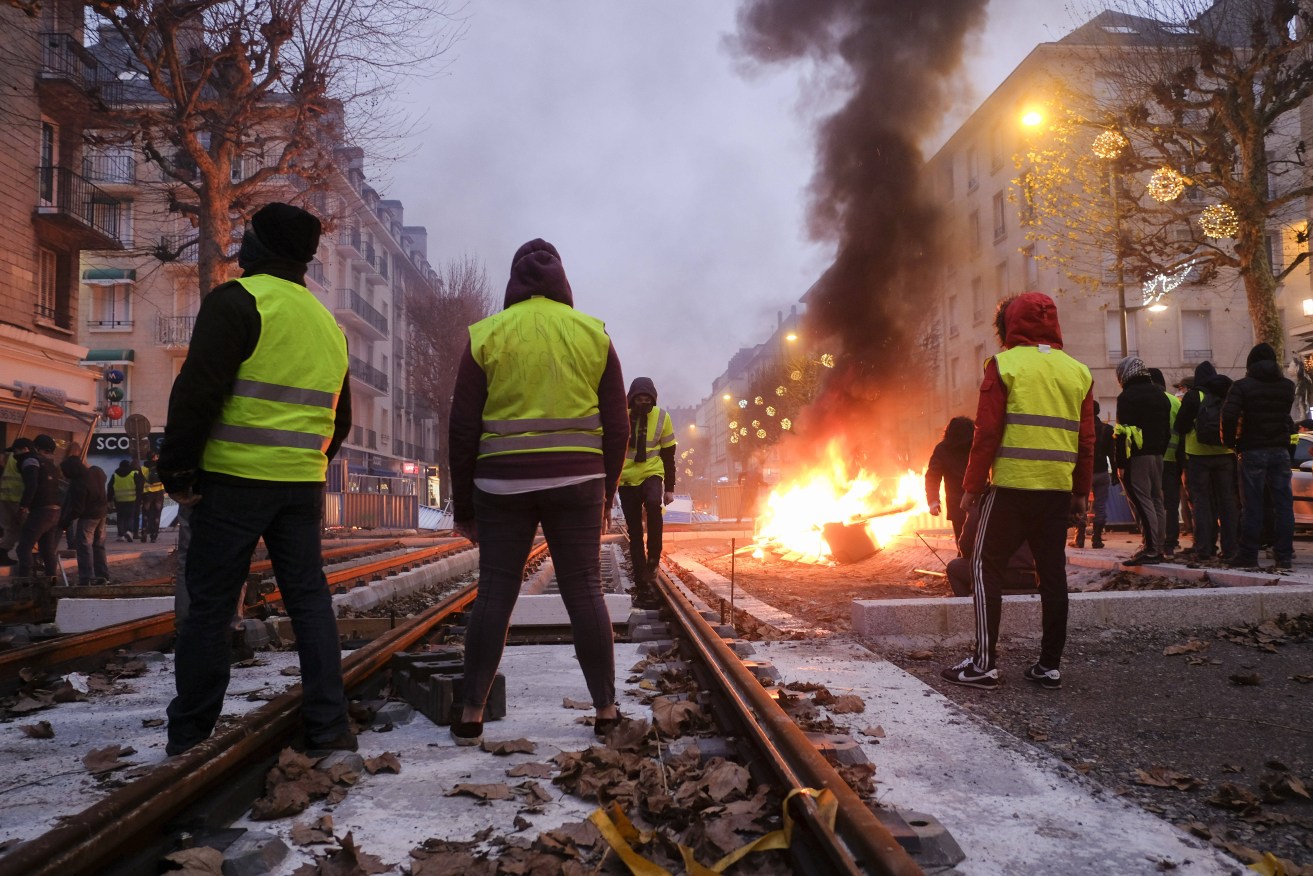Yellow Vests: An unprecedented uprising with a warning for democracies
A politically indiscriminate protest movement born in France poses a danger to democracy, writes Andrew Hunter.


Yellow Vest protesters in Caen, France, on Saturday. Photo: M Leligny/ANDBZ/ABACAPRESS.COM
The ‘Yellow Vests’ movement in France has no affiliation with a political party, no links to other organised movements, and rejects political cooperation of any form. Members of the movement see no solution in traditional political mechanisms and, while some of their language of protest is appropriated from the French Revolution, it has few precedents. The yellow vests reflect the despair felt by many people living on the fringes in western democracies.
The uprising started when a petition was posted online last May. Participants are broadly motivated by taxation reforms that disproportionately impact the working and middle classes, stagnant wages, and increasing costs of living. Protesters want these issues addressed, and for President Emmanuel Macron to resign. The movement has been described in six “Acts” and has resulted in 10 fatalities. The violence is great and it is blind. The emotive language of the protestors seeks to draw parallels with the French Revolution, with references to the guillotine and comparisons between the President’s wife, Brigitte, and Marie-Antoinette.
Perhaps the most fascinating characteristic of the uprising we see today is that it’s not aligned to any particular political party or other movements, such as organised labour. It’s assumed participants either did not vote in the last presidential election or voted for candidates from either the extreme right or left. While the protests are political in nature, the protesters don’t believe solutions can be found in the current structures and its elected representatives. This is disconcerting and dangerous to democracy.
For this reason, what we are seeing in France today has few precedents. Some commentators have drawn comparisons with the Popular Front of 1936. This is misleading. The Popular Front identified with the left of politics, whereas the Yellow Vests are politically indiscriminate. The Popular Front aligned with the French Communist Party, Workers International, and the Radical and Socialist Party. The Yellow Vests abjure alliance to any political party.
The level of confidence in traditional political structures and parties is similarly low in Australia, but will manifest itself in different ways.
The protests also have little in common with the student protests of 1968, half a century ago. The violence is more extreme and there is no shared vision of how the future should look. The protests in France today express rage at the present reality. The contrast in the language deployed, alone, is stark. It was recently remarked in Le Monde that in 1968, inscriptions on walls were both striking and profound, and held a literary quality. The protest graffiti in Paris today has, by comparison, a basic quality and expresses sentiments that are violent, obscene or homophobic.
No two situations are the same, so cautious consideration is needed before any relevance this uprising has to other democracies could be concluded. The relative level of political engagement in Australia and France, for example, is continents apart. I found, in eight years living in France, a far deeper engagement in politics than was the case in Australia, but its political class was, ironically, elitist and distant. When given a tour of the Luxembourg Palace, the seat of the French Senate, I asked my guide – a friend and senator – whether it was difficult not to feel distant from the voters he represented when legislating in such palatial and opulent surroundings. The question genuinely surprised him.
The level of confidence in traditional political structures and parties is similarly low in Australia, but will manifest itself in different ways. While in France protesting is considered an important instrument of democratic engagement, Australians will more likely express their discontent at the polling booth. Maybe we have a better appreciation of the reality of life in a democracy.
Jean-Jacques Rousseau scoffed at the English who believed themselves to be free merely because they voted. England, he argued, was “free only during the election of members of parliament. As soon as they are elected, slavery overtakes it, and it is nothing.”
If Australia is only free on election day, it is on election day she will express feelings about the way she is governed. If Australians feel the blind fury that marks protests on the streets of France, fewer people will vote, many more will vote for independents, and a considerable number will register a donkey vote. We will need to wait a few months to see if this is the case.
Uneasy lies the head that wears the crown. The next Federal Government, no matter what stripe, had better be a good one. If not, the value of democracy will be in question.
Andrew Hunter is an Adelaide writer and commentator on international relations.
The translations are the author’s.




